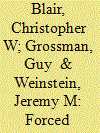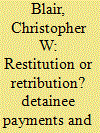|
|
|
Sort Order |
|
|
|
Items / Page
|
|
|
|
|
|
|
| Srl | Item |
| 1 |
ID:
175820


|
|
|
|
|
| Summary/Abstract |
As more women attain executive office, it is important to understand how gender dynamics affect international politics. Toward this end, we present the first evidence that gender stereotypes affect leaders’ abilities to generate audience costs. Using survey experiments, we show that female leaders have political incentives to combat gender stereotypes that women are weak by acting “tough” during international military crises. Most prominently, we find evidence that female leaders, and male leaders facing female opponents, pay greater inconsistency costs for backing down from threats than male leaders do against fellow men. These findings point to particular advantages and disadvantages women have in international crises. Namely, female leaders are better able to tie hands—an efficient mechanism for establishing credibility in crises. However, this bargaining advantage means female leaders will also have a harder time backing down from threats. Our findings have critical implications for debates over the effects of greater gender equality in executive offices worldwide.
|
|
|
|
|
|
|
|
|
|
|
|
|
|
|
|
| 2 |
ID:
186189


|
|
|
|
|
| Summary/Abstract |
Little theoretical or empirical work examines migration policy in the developing world. We develop and test a theory that distinguishes the drivers of policy reform and factors influencing the direction of reform. We introduce an original data set of de jure asylum and refugee policies covering more than ninety developing countries that are presently excluded from existing indices of migration policy. Examining descriptive trends in the data, we find that unlike in the global North, forced displacement policies in the global South have become more liberal over time. Empirically, we test the determinants of asylum policymaking, bolstering our quantitative results with qualitative evidence from interviews in Uganda. A number of key findings emerge. Intense, proximate civil wars are the primary impetus for asylum policy change in the global South. Liberalizing changes are made by regimes led by political elites whose ethnic kin confront discrimination or violence in neighboring countries. There is no generalizable evidence that developing countries liberalize asylum policy in exchange for economic assistance from Western actors. Distinct frameworks are needed to understand migration policymaking in developing versus developed countries.
|
|
|
|
|
|
|
|
|
|
|
|
|
|
|
|
| 3 |
ID:
183778


|
|
|
|
|
| Summary/Abstract |
Cooperation among militant organizations contributes to capability but also presents security risks. This is particularly the case when organizations face substantial repression from the state. As a consequence, for cooperation to emerge and persist when it is most valuable, militant groups must have means of committing to cooperation even when the incentives to defect are high. We posit that shared ideology plays this role by providing community monitoring, authority structures, trust, and transnational networks. We test this theory using new, expansive, time-series data on relationships between militant organizations from 1950 to 2016, which we introduce here. We find that when groups share an ideology, and especially a religion, they are more likely to sustain material cooperation in the face of state repression. These findings contextualize and expand upon research demonstrating that connections between violent nonstate actors strongly shape their tactical and strategic behavior.
|
|
|
|
|
|
|
|
|
|
|
|
|
|
|
|
| 4 |
ID:
186814


|
|
|
|
|
| Summary/Abstract |
Counterinsurgents frequently rely on mass arrests to impede rebel operations, but in so doing, risk detaining innocent civilians. Wrongful detention can backfire, fueling insurgent violence by alienating detainees and their kin. Can counterinsurgents mitigate wrongful detention through targeted compensation? I study this question using project-level data on US payments to individuals deemed innocent and released from Coalition custody in Iraq between 2004 and 2008. Leveraging plausibly exogenous variation in the allocation of detainee release payments, I document a robust, negative association between counterinsurgent compensation for wrongful detention and insurgent violence. The violence-reducing effects of detainee release payments were greatest in Sunni and mixed sectarian areas; for the types of insurgent attacks, most prone to civilian informing; and when detainee release was complemented by other population-centric reforms. These results suggest that post-harm mitigation helps shift civilian perceptions, inducing civilians to share more information with counterinsurgent forces.
|
|
|
|
|
|
|
|
|
|
|
|
|
|
|
|
|
|
|
|
|